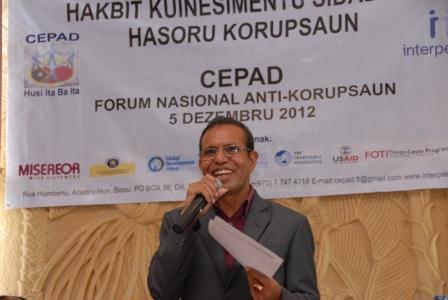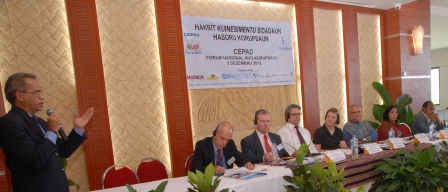Timor-Leste: Raising public awareness to combat corruption

To mark the International Anti-Corruption Day on 9 December, a national forum was held in Timor-Leste involving over 275 Timorese citizens. They were joined by political leaders, civil society organizations, high-level representatives of the international community and journalists. The conference organized by Interpeace local partner, the Centre of Studies for Peace and Development (CEPAD), focused on corruption, collusion and nepotism known as “KKN” in Timor-Leste. Combating KKN is one of the priority issues identified by Timorese as being necessary for sustainable peace and development.
Recommendations to tackle corruption
Over 130 citizens from all sides of Timorese society came together to validate the recommendations that have been developed over the course of this year by a national Working Group on KKN. With a focus on inclusiveness, the Working Group consulted over 330 community members from throughout Timor-Leste’s 13 districts to develop recommendations to address ongoing reform processes. The recommendations for social, legal and constitutional reform included ways to improve the current weak anti-corruption legislative framework, the need to strengthen control systems and the regulation of political parties. Participants also discussed the establishment of a permanent civic education campaign to empower citizens with better knowledge and understanding of corruption and democratic rights and responsibilities within the Timorese context.
João Boavida, Executive Director of CEPAD, explained: “We need to work together to raise public awareness to combat corruption in Timor-Leste. The lack of political will should no longer be an obstacle on our path to combating corruption in this country. This fact became obvious as participants gathered here committed to take on corruption as a national cause. We were exposed to a wide range of ideas and opinions on how best to implement the recommendations put forward by national and international participants alike.”
Timor-Leste – a unique example
In his keynote address, Matthias Stiefel, Founder and Vice Chairman of Interpeace, highlighted how corruption hinders peace processes and post-conflict reconstruction. Following an introduction to the work of Interpeace, he shared insights from other Interpeace partner teams, while stressing that corruption is often a national problem in need of national solutions.
“In my experience, Timor-Leste is one of the only countries to openly tackle corruption. This is truly unique in post-conflict societies.” said Matthias.
A line-up of prominent speakers
Additional opening remarks were provided by Dr. José Ramos-Horta, Former President of the Republic of Timor-Leste and Nobel Peace Prize Laureate; and Judith R. Fergin, Ambassador of the United States of America to Timor-Leste. National and international perspectives on fighting corruption were also presented by Adérito de Jesus Soares, Timor-Leste’s Anti-Corruption Commissioner; John Hyde MLA, Member for Perth and GOPAC International Board Member; and Luis Constantino, World Bank Country Director in Timor-Leste.
 Photo credit: João Vas for Interpeace |
The National Forum was closed by the current President of the Republic, H.E. Taur Matan Ruak in the presence of members of parliament, senior government officials, civil society representatives, academics, religious leaders and journalists.
National and international keynote speakers agreed that fighting corruption and building trust between citizens and the state will be essential for the consolidation of democracy in Timor-Leste, as the country seeks to move beyond post-conflict reconstruction to sustainable peace and development.
CEPAD’s work in Timor-Leste
CEPAD works year round to consolidate peace in Timor-Leste through the engagement of Timorese stakeholders in the identification and articulation of the most pressing obstacles to lasting peace. CEPAD promotes a better understanding of the origins and the dynamics of conflict in Timor-Leste. They work with a cross-section of society to define the means to address conflict in non-violent and sustainableways.
This third National Forum in Timor-Leste was convened with support from MISEREOR, the German Catholic Bishops’ Organization for Development Cooperation.
